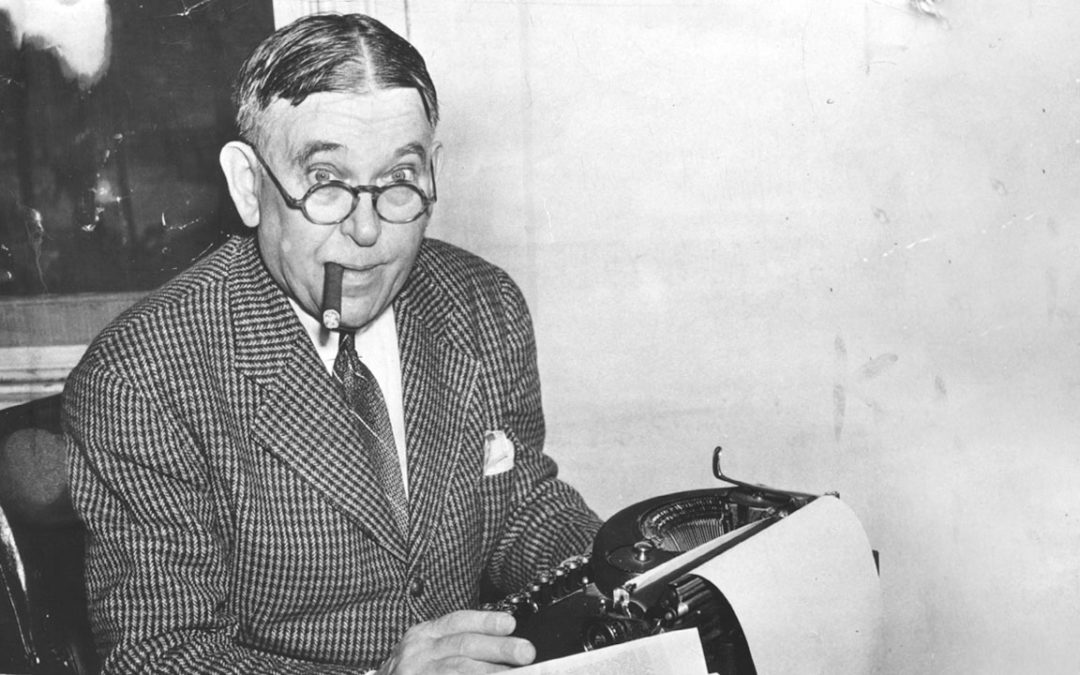
by Robert Bowie, Jr. | Sep 7, 2021 | Featured, Politics
“The whole aim of practical politics is to keep the populace alarmed (and hence clamorous to be led to safety) by menacing it with an endless series of hobgoblins, all of them imaginary.” — H. L. Mencken
September 12 is H.L. Mencken’s birthday. He was a wonderful provocative opinionated Baltimore Sun newspaperman who was definitely not politically correct and loved to piss off everybody. Times such as these require we celebrate six days early.
Though I could never match him the only way to celebrate him is follow his lead. Please accept this as all in good fun.
My celebration is in two parts.
Part 1
Extra! Extra! Read all about It! Where in the Constitution is the freedom of choice?
“Democracy is the theory that the common people know what they want, and deserve to get it good and hard.” — H.L. Mencken
Let us first consider American “freedom of choice,” which has been heavily relied on by anti-vaxxers and the intellectuals on Fox News.
Let’s start with a little history. In the mid-1950s, my mother joined all the other mothers back then who lined up their children for the new polio vaccine and thereafter for mumps, measles and who knows what including all kinds of booster shots. It was so long ago there were “pin cushion” jokes. Back then, people had sewing machines and pin cushions.
Yes! These were the days when tattooed people were not afraid of needles and vaccinations were not considered to be secret government IQ tests.
It wasn’t perfect but I am sure that many of us are alive today because our “Rosie the Riveter” mothers, fresh from their patriotic duties and the sacrifices of the Second World War, grabbed their first graders and put them in line.
It was a civic duty that their children were safe and also were not spreading any infectious diseases. I guess today they would be blamed for not looking out for #1.
This is not to say I have given up on the present.
I was very happy when almost every anti-vaxxer to whom I talked refused to tell me where this “freedom of choice” is located in the Constitution. But was saddened that nonetheless they said it was “in there someplace.”
Unfortunately, after a careful review of the Constitution, I discovered “freedom of choice” is in fact from a short-lived Burger King advertisement. The fact that it was short-lived seems to indicate that most of these Americans preferred uniformity in their Whoppers.
When I argued that perhaps freedom of choice at least requires a concern for others and it was inappropriate to disseminate misinformation and cited my mother as an example, I got nowhere.
For my back-up authority for both proposals I asked If they recognized these names: Marc Bernier, Dick Farrel, Tod Tucker, Jimmy DeYoung Sr., and Phil Valentine? I pointed out that they had two things in common: they have all made a fortune as anti-vaxxer talk show hosts and they have all died of COVID. I can’t even imagine how many people they took with them, as the numbers continue to multiply.
Part 2
Extra! Extra! Read all about it – Are we back to deputizing bounty hunters?
“There is always an easy solution to every problem — neat, plausible, and wrong.” — H. L. Mencken
As you already know by now the Supreme Court’s decision last week finds no constitutional problem with Texas bounty hunters receiving up to $10,000 for reporting anyone who “aids or abets” an untimely abortion.
The Court’s decision sidesteps the right to privacy of a woman which remains constitutional in Roe v. Wade but lets stand that bounty on anyone, including nurses or doctors, who make any effort to help her.
These developments will be obviously universally supported by our fellow Americans since recently we love and elect presidents that have acted as cowboys in the movies or have been on reality TV.
Nonetheless, I think that the current Supreme Court is showing us the way to solve all of our current problems if we just support the constitutionality of this decision and embrace its wisdom.
There seems to be no constitutional reason we cannot employ bounty hunters to ensure our personal freedoms, cut unwanted government protections, and also cut taxes.
Consider traffic safety. What a wonderful way to get rid of police expenses and cut the costs of enforcement. We can eliminate road rage by merely reporting on bad drivers and collecting the bounty.
Our federal and state highways could be a reenactment of the carnival game Whack-a-Mole or a video game and advertising will increase substantially for drive time traffic updates. It will be great for business and prevent us from having to raise the minimum wage.
This opportunity has no limits! We can finally all be safe if we each are bounty hunters reporting on each other for any violation of any law. There may be one problem though: how do you collect the bounty if there are no police to enforce it?
But once again the current Texas Republican Party and the current Supreme Court helps us understand that the second amendment has been there all along. We the people finally will be the “well-regulated militia,” which the Supreme Court has previously ignored.
If you think about it, we can even eliminate election fraud if “we the people” police them. We can ensure fair elections and “stop the steal” if we have televised shootouts between the candidates.
Let’s give credit where credit is due. These are the new breed of Trump Republican that have modernized the party. Completely different than my old Republican heroes like President Eisenhower, Chief Justice Warren, or Senator Charles Mathias for whom I was proud to have worked for when people from both parties worked together for the good of the nation. But that was the old Republican Party.
I apologize. Mr. Mencken made me do it. He was born in 1880, so on September 12th he would have been 141 years old and almost half the age of our country.
“If, after I depart this vale, you ever remember me and have thought to please my ghost, forgive some sinner and wink your eye at some homely girl.” — H. L. Mencken
I am not worthy. He was politically incorrect but he still can shock you and make you laugh. Hats off to my friend David R. So, let’s get this party started!
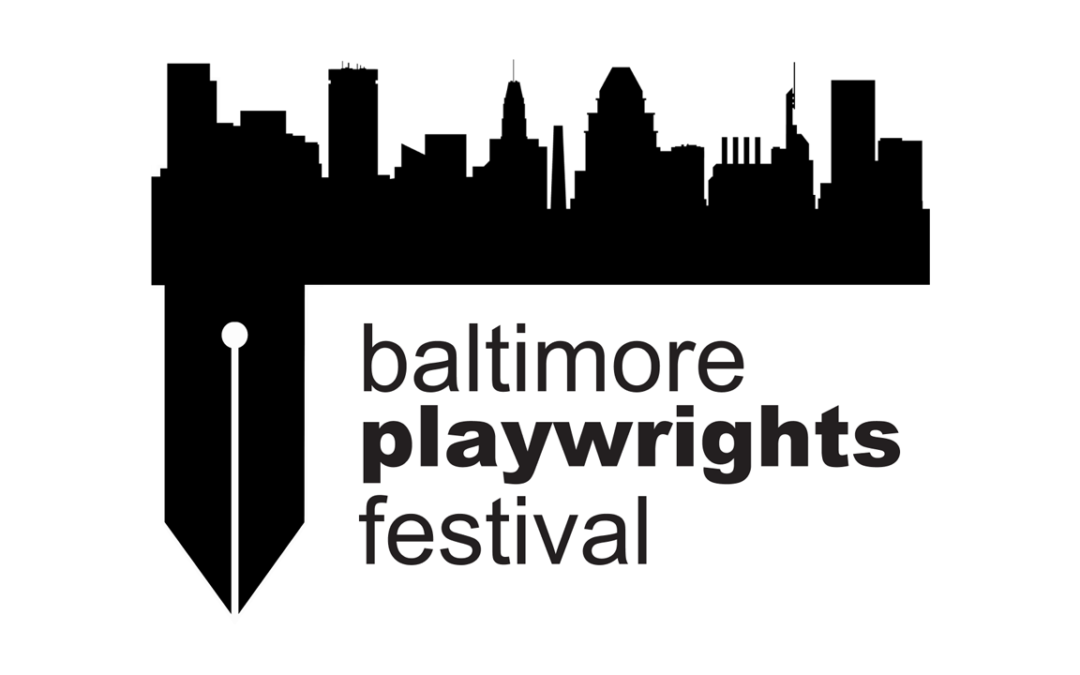
by Robert Bowie, Jr. | Aug 31, 2021 | Featured, Plays
Baltimore is a great theater town but sometimes you have to leave home to appreciate it. It offers way more access and opportunities than the theater world recognizes.
Last week, I traveled to New York and stayed at a hotel in the East Village across the street from the Village Voice. The hotel had floor-to-ceiling windows which overlooked the street. The incoming students at Cooper Union and NYU were just getting to know the city and each other as they moved through the late summer heat. The mask requirements had been reinstated for indoor spaces, but you could feel the city coming back again and, with it, a flood of joy and happy memories.
One late afternoon a few weeks before the pandemic, after a table read of The Grace of God & The Man Machine, I was drinking with the actors at The Triple Crown at 29th and 7th Avenue, a semi-dive next to The Opera Center offices where the reading had taken place.
I was bellyaching about being a geezer, starting my career as a fledgling writer so late in life. Two beautiful things happed almost simultaneously.
First, several of the actors, who, in some cases were easily half my age, somewhat seriously, told me to “shut up and grow up.” They had no pity for me, they told me unceremoniously. They were trying to make ends meet and support a family as they pursued opportunities in order to learn their craft and develop an acting career. Meanwhile, I was able to write all day and still cry in my beer. Second, they buttressed their argument by reminding me of something I had just told them moments before. I had apologetically said I have had 10 plays performed in the little theaters in Baltimore.
It was all true. I had taken it for granted. Baltimore from top to bottom is an oft-unrecognized theatre town full of opportunity. At the top, The Everyman Theater and Center Stage are nationally recognized and Everyman stands out because it has built a company which supports its actors and offers its audience the chance to get to recognize these actors.
The theaters such as Fells Point Corner, Audrey Hermann Spotlighters, The Vagabonds, Theatrical Mining Company, and others produce monthly shows at reasonable admission prices and offer competitive opportunities for actors, directors, stage designers and techs young and old. For over 25 years, they have sponsored the Baltimore Playwright’s festival, which pays burgeoning playwrights a small stipend and offers new work and summer performances.
But perhaps even more supportive are professional theater critics, such as Judy Rousuck, who have covered the Kennedy Center and the Baltimore regional theaters for years, and have also gone out of their way to cover the little theaters as well, reviewing them in The Baltimore Sun and WYPR radio, the NPR affiliate.
I had never really recognized the greatness of Baltimore theater and how much I had benefited from it until I left home and abruptly recognized the good fortune and education I had received at home.
How odd that the rebirth of New York theater would bring me back to my genesis in Baltimore. I have nothing but love and appreciation for the place and the friends and mentors I have made and found there.
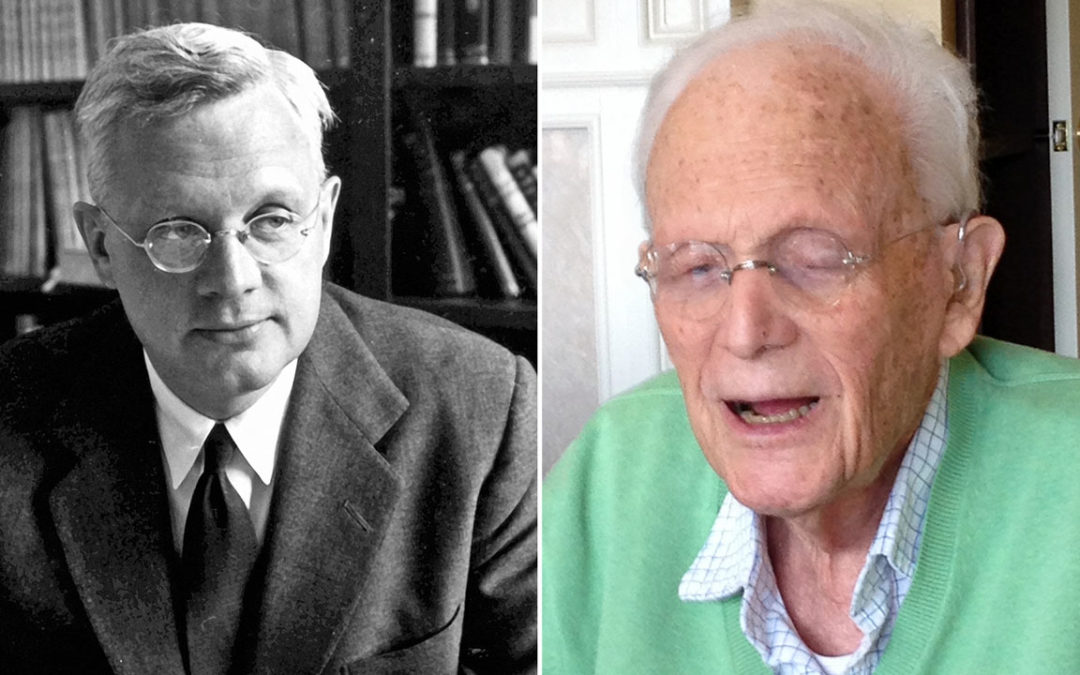
by Robert Bowie, Jr. | Aug 24, 2021 | Featured, Personal, Poetry
Today is my father’s birthday. He was born August 24th, 1909 and died November 2nd, 2013. Somehow my love and respect for him continues to grow. It happened over time but it is much like what Mark Twain said:
“When I was a boy of 14, my father was so ignorant I could hardly stand to have the old man around. But when I got to be 21, I was astonished at how much the old man had learned in seven years.“
Imagine how “astonished” I was by “the old man” after I had continued to witness his learning as he passed 100. He set the standard. He told me one time, “I love you, but I don’t respect you.” He was right. He was always razor sharp and I grew to want his respect.
He had been first in his class in everything he had ever done and could cut through the fog to get to the heart of an issue with a single lightning bolt comment, but the real reason I thought so highly of him was I saw him choose to live with determined integrity.
During the last 15 years of his life, he lived in a retirement home near where I worked. The other old men on his floor gave up shaving for weeks but I would always shave him before he would leave his room as my show of love and respect. I would visit him every afternoon and wheel him into dinner unless I was in a trial or out of town.
In the mid-1990s, in yet another effort to win his respect, I enthusiastically informed him that this new Internet thing would open us to world peace. He smiled and said, “probably not that easy.” He was right and I was flat on my face again. I could only think of what he must have thought of me in my teens during the “don’t trust anybody over 30” period.
I was the worst kid ever. I had undiscovered learning issues back then, and well-developed disciplinary problems. I kept getting thrown out of school and — to make things worse — I would disappear to hitchhike through at least 40 of the states.
One time when I was heading back to Maryland, I called home from a payphone in a Howard Johnson’s south of the Chicago because a driver who picked me up bribed me with food if I would call my parents to tell them that I was coming home. My mother answered the phone and could not stop crying because she said she had been so worried. Despite my misspent youth, my father and mother never gave up on me. I was their son despite my failures. They would do the right thing. That determined integrity was a commitment to love. I wanted to learn that.
One afternoon when he was 94, he complained of pains in his lower abdomen and after an ambulance ride to the hospital he was admitted to surgery.
As I prayed in an empty waiting room very late at night, I thought I was never going to see him alive again. On scratch paper I sketched out a sonnet of remembrance. I wrote it after they wheeled him out of the operating room.
My Father
In the end it’s touch that holds memory.
The other senses are immediate
And defend the present territory.
The other four are there to navigate.
Tonight my father went under the knife
And I waited alone with my cell phone
To see what would become of this one life;
Together, separate, and both alone.
For an hour in the last waiting room,
I remembered him as sound and insight,
Too perspicacious for the cool boxed room
That would contain him in this, his last night.
At ninety-four how could he have survived?
I kissed the forehead of a man, alive.
As he approached his 100th birthday, we were talking and he, almost as an afterthought, said, “I admire what you have accomplish with your life. I’m not sure I could have done what you have done.” I don’t think he ever realized that was the one thing I had always hoped to hear from him. Our last years together we’re perfect. He had never withheld love. I just had refused to accept its responsibilities.
Shaving My Father
(From a draft I wrote the day after my father’s death at 104.)
This is the last small room in which he will rest.
Every day I visit him at four o’clock.
We balloon the room with our forgiveness.
“Either this man is dead or my watch has stopped.”
Two men knock on his door then wait like guests.
“Not funny for a man this close to death.”
We share what only dark humor can express.
The Marx brothers, for both of us, are the best.
The electric razor hums in my hand
As it cuts along the cheekbone and the neck.
Like a harvester on pre-winter land
I harvest thistle from earth’s intellect
Across a snow bank of thin paper skin.
They zip their bag shut and leave me without him.
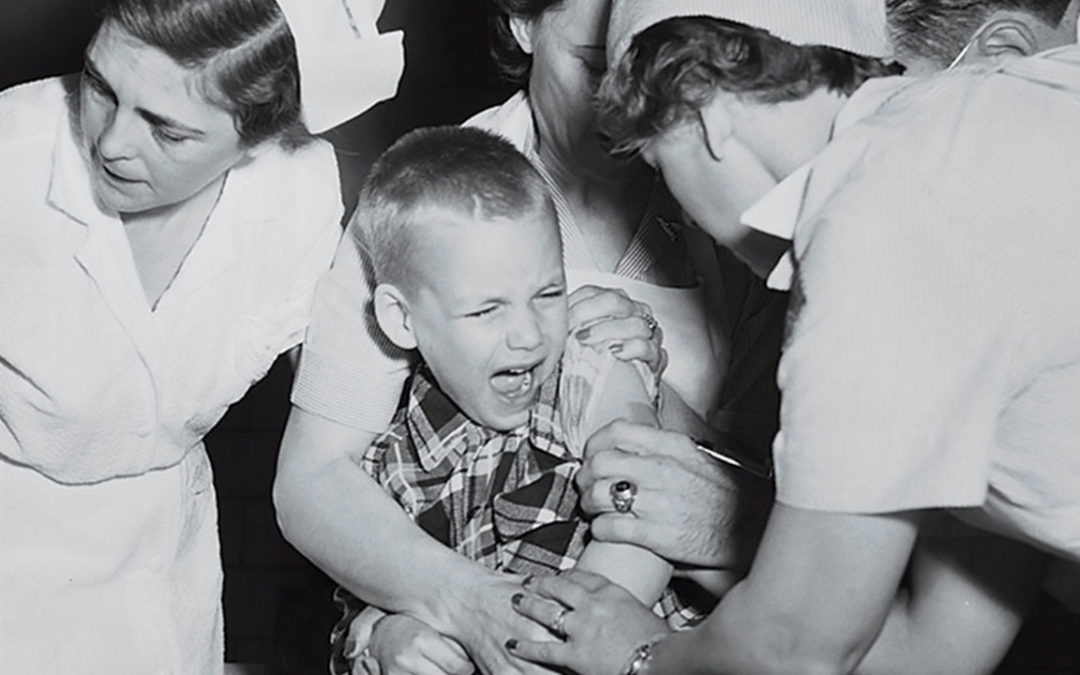
by Robert Bowie, Jr. | Aug 17, 2021 | Featured, Personal, Politics
I’ve got you beat! Have you ever been vaccinated for rabies?
Years ago, my young family was traveling back from Frederick, Maryland after the 4th of July when I asked my wife to pull over because I saw an injured baby raccoon by the side of the road.
I love all living things and most humans.
The little raccoon was so small it fit into the palm of my hand. I took it home that night, named her Thomas Jefferson — because it was the 4th of July after all — and started to feed her with an eye dropper.
I researched diet and organized my schedule to ensure regular feedings, but it was too late. Three days later, she started to die. Despite my efforts, somewhere around 3 o’clock in the morning she stopped breathing.
When I told my wife the next day, she was understandably horrified. She informed me that it was possible that I could have gotten rabies and I must get vaccinated.
I voluntarily got the shots and became the hero and laughingstock of my little neighborhood. They would turn to each other and point at me approvingly and say, “if you see a rabid animal call Bob because he can bite back.”
So why did I voluntarily get those shots back then?
I didn’t really volunteer to be the game warden for my neighborhood but I did not want to get rabies and I certainly didn’t want to involuntarily bite somebody.
I also wondered if rabies shots were mandatory. I was surprised to find that with the exception of Kansas, Missouri, and Ohio, every state in the union has mandatory rabies vaccination laws for domestic pets but apparently not for their owners. The success that public health officials have had in controlling rabies is due to vaccinating domestic pets.
But what does this say about my parents? I got vaccinated for everything! Did they treat me like a pet?
As a child, I had been vaccinated for typhus, measles, mumps, and polio, and our reservoir water had been treated with fluoride to save our teeth. All this in order to protect the living generation from the transmissions of death and worse, tooth decay. I remember there were protests against all of these vaccinations at the time.
Recently, it occurred to me: Why not smallpox?
Why didn’t our pets and I get vaccinated for smallpox? It must have been mandatory! Because of this oversight could I have accidentally passed on smallpox and kill somebody?
So, I did the research.
In Europe smallpox vaccination began in the early 1800s, after Edward Jenner did cowpox experiments, in which he showed that he could protect a child from smallpox if he infected him or her with cowpox blisters. Jenner’s ideas were met with immediate public criticism. The rationale for this criticism varied, and included sanitary, religious, scientific, and political objections.
What a wonderful surprise!
Almost two centuries after Jenner hoped that vaccination could annihilate smallpox, the 33rd World Health Assembly declared the world free of this disease on May 8, 1980. Many people consider smallpox eradication to be the biggest achievement in international public health.
I felt even better when I concluded that it was patriotic to be vaccinated.
René F. Najera, DrPH, the editor of the History of Vaccines, an online project by the College of Physicians of Philadelphia, reported that there is good evidence that the United States won the War of Independence because of vaccine’s precursor: inoculation.
Among the Continental regulars in the American Revolution, 90 percent of deaths were caused by disease, and Variola — the small pox virus — was the most vicious of them all.
On the 6th of January 1777, George Washington wrote to Dr. William Shippen Jr., ordering him to inoculate all of the forces that came through Philadelphia. As he explained:
“Finding the Small pox to be spreading much and fearing that no precaution can prevent it from running through the whole of our Army, I have determined that the troops shall be inoculated… Necessity not only authorizes but seems to require the measure, for should the disorder infect the Army… we should have more to dread from it, than from the Sword of the Enemy.”
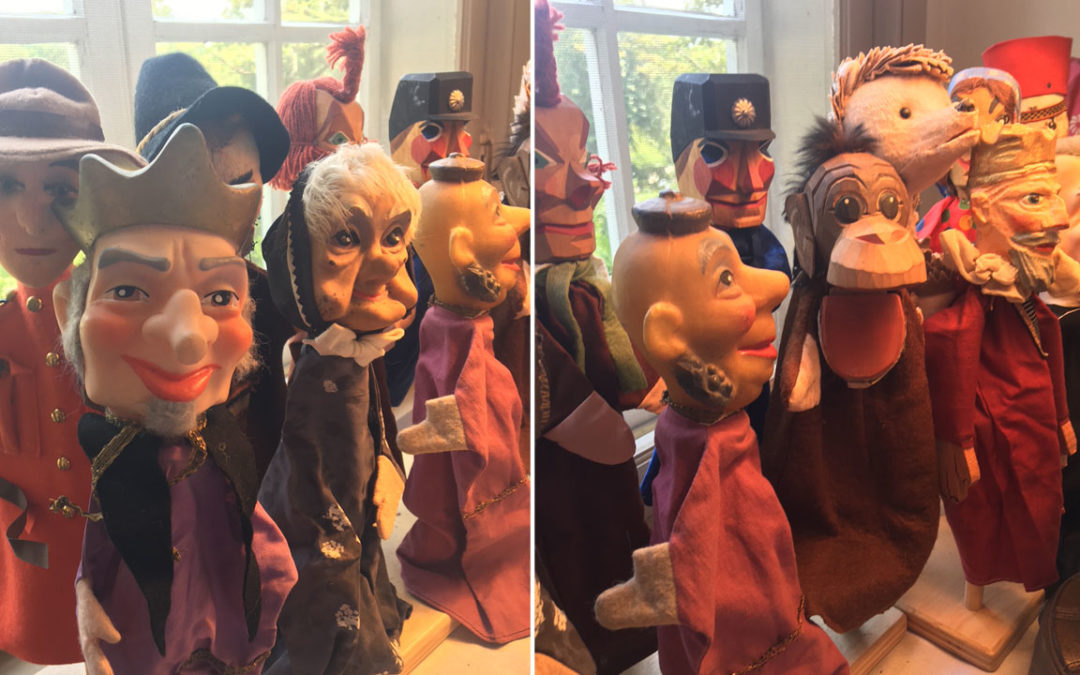
by Robert Bowie, Jr. | Aug 10, 2021 | Featured, Plays
I have always been a religious man.
I have always had a deep and abiding religious belief in delusions of grandeur.
This week, COVID and the new Delta variant are again threatening to curtail the opening of New York theater, and with it, so goes again my new play, The Grace of God & The Man Machine.
It is times such as these one must fall back on faith!
It is times such as these when I feel compelled to explain the basis for my belief in delusions of grandeur and why the hell I ever decided to write for the theater.
Is there no justice? I offer you, this, my theatrical pedigree:
My first big break in theater came in fourth grade at an all-boys school when the music teacher chose a friend and I to write the big closing song for our fourth grade graduation. The thespian spirit moved me! I insisted that we end this artistic opportunity with an emotional final line, a big crescendo, in order that we fully convey our deep love of fourth grade.
I was gunning for full tears from a breathless waiting audience of emotional parents as they heard that last line rising to its explosion of emotion with the piano teacher banging out the music as all my fellow fourth graders sang:
”… and we will always love fourth grade even when we’re dead and gone!”
There was stunned silence. There were no tears. There was an explosion of laughter!
That should’ve ended my career. But no…
By eighth grade, my fragile thespian spirit had revived. I had gathered a large collection of hand puppets so I offered to put on a performance for the entire middle school.
It would be a love story!
My mother had typed out my script but I could not read it at the same time as I was putting puppets on both hands. So, I soon abandoned the script and turned to all-out stage violence. I had the entire middle school with me all the way until I lost one of the fighting puppets over the edge of the stage and my puppet stand fell into the fifth grade.
I got my first bad review from a seventh grade teacher. He looked down his nose after everyone had left and asked me: “Where did you get your inspiration for that?”
My love story had unexpectedly turned into improv but it was my obligation to tell the truth. I think I told him I was writing, as all great writers do, from what I knew. I am pretty sure I told him: “Recess.” The show closed on my opening afternoon.
That should’ve ended my career. But no…
By high school, I had given up writing for the stage but still was not able to avoid further theatrical embarrassment. The drama teacher asked me to act what he called “a small part” in The Crucible by Arthur Miller.
Apparently the first choice for the part had dropped out. I had been given the first scene in which my character, the Reverend John Hale, first enters and I was told to read it for the tryout the next day.
I was surprised but flattered when, before the reading, I learned that I had been given the part. I was shocked that evening when I took home the script and found out that my character also appeared in the second act. The more pages I turned, the more horrified I became.
Not only did I embarrass myself on stage, I even embarrassed myself in the dressing room. Back then all stage actors, particularly if they had as many lines as I did, were “tall, dark, and handsome.” As I was putting on my makeup before opening night, the director stopped in front of me and waved his hands wildly and without a moment of kindness told me: “No! No! No! You don’t need a suntan. This is winter in New England.”
That should’ve ended my career. But no…
It got worse. I just couldn’t let it go. I started writing plays for the little theaters in Baltimore. After my first play, Oriole Magic, had been cast, I shared my high school disgrace with the actors, and told them how much I admired their talent because I had developed an overriding fear of acting.
On opening night, the director came to me and told me that the leading man had dropped out of the performance and that I had to take the role. I was beyond terrified. I now would be confronted with the most horrible nightmare I could imagine… I was about to forget the lines that I had written in front of a live audience.
I fled to the bathroom fully intending to lock myself in — but once I got in there, the lead actor, who I was supposed to be replacing, could not stop laughing.
So why do I keep writing for the theater?
I think the answer is I just want to be near it. There are so many happy memories. I wrote ten plays for the wonderful little theaters in Baltimore and though many were horrible, particularly the early ones, I was forgiven my transgressions and encouraged to write again and again. It is these people I remember with great fondness and respect.
Also, when I had difficulty with school, my parents helped me get through those times. They discovered my love for telling stories before I did. My father brought back hand puppets from his travels and built me a puppet stand in the basement. My mother stitched up the puppets when they were broken and got me to lie on my bed on the third floor and dictate stories to her as she typed them out on her old typewriter.
When I improbably committed to attempting to write professionally for New York theatre, I was not shunned. I was welcomed by an amazing group of unique artists who were so talented that they could turn words and beautiful collaborative friendships into worlds in which I could live for an hour or so.
It is too late now. I know why. It is the thing itself. I love it so… and, of course I have this new idea for a wonderful play…
Back to work.





